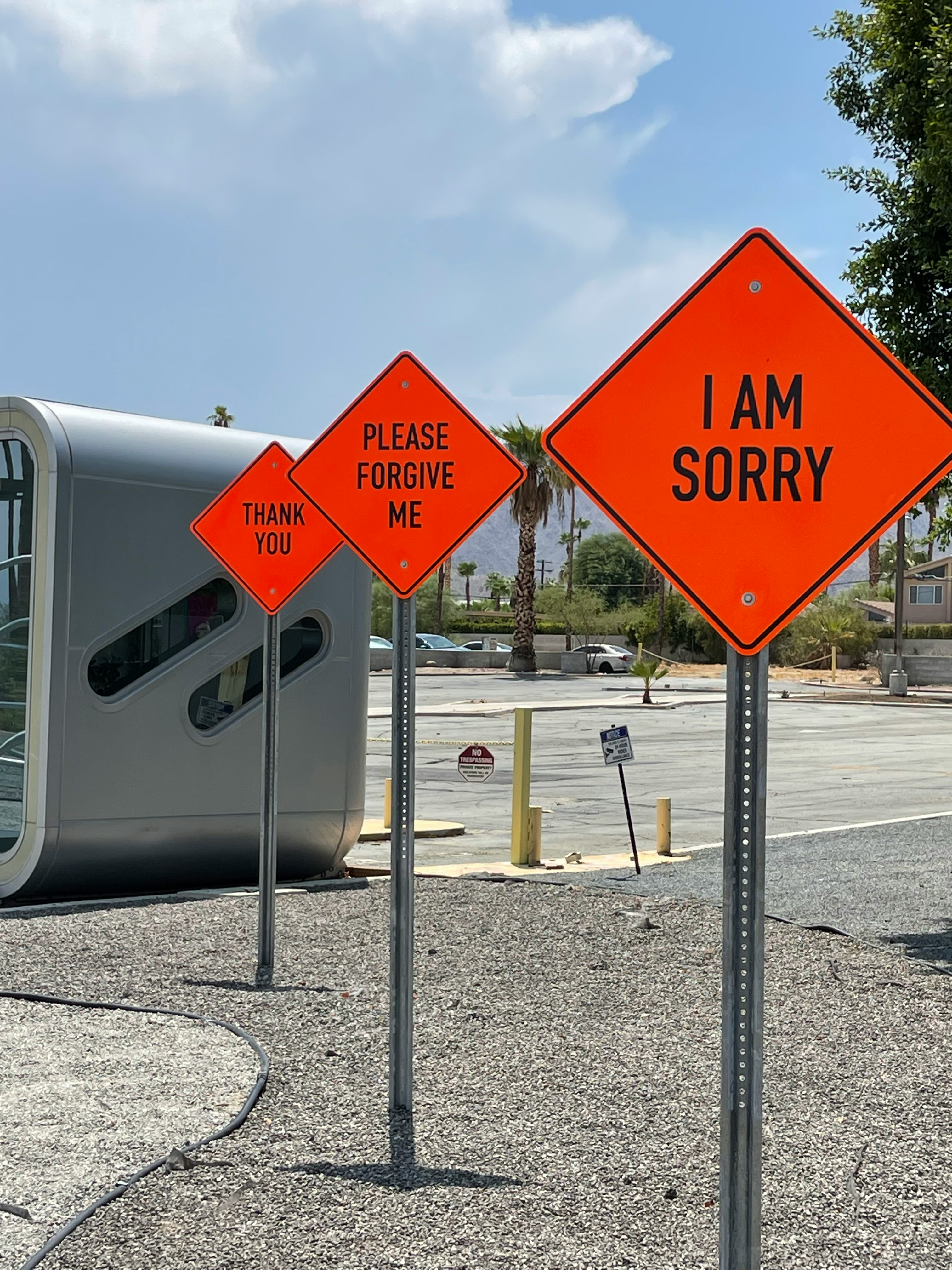How To Say Sorry - The Art of Apologizing
Why Apologizing Is Essential For Founder's Well-Being - Master the Skill That Can Transform Your Life and Relationships
I'm Manuel Saez, I write to help founders master emotional intelligence to make decisions with clarity 🌻 EQ coach, 2X-founder & award-winning designer ➜ I love fixing old motorcycles 🛵 🏍
Reading time: 9 min.
Contents:
Understanding The Difference Between Saying Sorry And Apologizing
Why Holding Grudges Can Be Harmful To Your Mental Health
Apologizing Is A Sign Of Strength And Not Weakness
The Power Of Love And Compassion In Healing Relationship Wounds
Overcoming Pride And Ego To Apologize With Sincerity
The Role Of Self-Reflection In Apologizing And Moving Forward
The Psychological Benefits Of Apologizing For Yourself And Others
How To Apologize - Tips For Giving A Sincere Apology
Conclusion
Apologizing can be an uncomfortable and even overwhelming experience. It's easy to understand why so many of us struggle—confronting our mistakes to seek resolution or closure takes courage, humility, and vulnerability. But apologizing is so much more than simply uttering those two words—it's about understanding how our actions have impacted another person and assuming responsibility for them.
It's no wonder many of us avoid apologies altogether. We may not want to open the door to further conversation, feel ashamed for having made a mistake, or perhaps we don't know how to offer a sincere apology.
Whatever the reason, failing to apologize for our wrongdoings can have severe repercussions on our personal and professional relationships.
Understanding The Difference Between Saying Sorry And Apologizing
We all know how hard it is to apologize. It can be daunting, especially when we've done something wrong and must take responsibility for our actions. But apologizing isn't just about saying sorry—it's about expressing regret in a sincere way that genuinely shows you understand the impact of your mistake.
Saying sorry is only part of an apology; it doesn't always compensate for the hurt someone has experienced due to your words or behavior. When we are willing to step out of our comfort zone and apologize, we open ourselves to healing and growth while taking ownership of what happened.
Apologizing is liberating because once we have taken responsibility, we can begin looking ahead with hope instead of dwelling on the past. A good apology should include the following:
An explanation (not a justification).
Acceptance of blame.
Full ownership of one's actions.
Assurance that the same thing will not happen again.
Ultimately, understanding the difference between saying 'sorry' and apologizing helps us take responsibility for our mistakes and move forward in life with grace and strength.
Why Holding Grudges Can Be Harmful To Your Mental Health
It's tough to accept responsibility for our mistakes, let alone convey remorse without feeling guilty or embarrassed. But it's important to remember that expressing a genuine apology is a sign of strength and maturity.
Holding grudges has detrimental effects on both mental health and relationships. Here are some ways holding grudges can harm your mental health:
Physiological Effects:
Increased stress levels: Holding grudges can lead to chronic stress, negatively affecting physical health.
Reduced immune system functioning: Prolonged stress can weaken the immune system, making individuals more susceptible to illnesses.
Heightened blood pressure: The stress response can raise blood pressure, leading to cardiovascular problems over time.
Psychological Effects:
Depression & Anxiety: Holding onto negative emotions can contribute to developing depression and anxiety disorders.
Poor sleep & fatigue: Chronic stress can interfere with sleep quality, leading to fatigue and other related symptoms.
Behavioral Changes:
Avoidance behavior − Irritability & Aggression: Holding grudges can result in avoidance behavior, irritability, and aggression towards others.
These physiological, psychological, and behavioral changes often lead to further negative consequences in the long run, such as increased substance abuse, physical illness, relationship issues, etc. Therefore, it's essential to practice self-awareness when dealing with difficult situations to learn how to release any built-up resentment instead of burying it deep within ourselves, where it will eventually come out in destructive ways.
Letting go of grievances is one fundamental way to maintain healthy mental well-being, and it should always be considered before resorting to holding onto grudges indefinitely.
Apologizing Is A Sign Of Strength And Not Weakness
Many people struggle to apologize out of fear of appearing weak or vulnerable. However, saying sorry is a sign of strength because it demonstrates humility and shows that one has the emotional capacity to acknowledge their mistakes.
When done correctly, an apology conveys remorse and regret. It acknowledges the hurt caused by mistakes without making excuses. Knowing how to right your wrongs is critical to rebuilding trust and repairing relationships.
In addition to restoring harmony between two parties, apologizing brings closure and peace of mind to the person who apologizes as they can put aside lingering guilt over errors in judgment. Saying "my apologies" allows us to remain true to ourselves when we feel bad about our behaviors or choices instead of trying to ignore them or avoiding taking ownership of them.
Effectively saying sorry requires courage, compassion, and understanding, qualities that demonstrate inner strength rather than weakness; ultimately, it will bring more light into your life by helping you build healthier relationships with others and yourself.
The Power Of Love And Compassion In Healing Relationship Wounds
A sincere apology made in kindness will help build trust and respect between people again.
But just saying 'I'm sorry' isn't enough - an effective apology requires taking responsibility for our actions or words, admitting mistakes, and promising to do better in the future.
When we apologize sincerely, even when things are difficult, it shows a willingness to take ownership of the situation and repair any hurt feelings. We also show love and compassion because we care about how someone else feels; this sets us on track for reconciliation rather than further conflict.
To ensure an apology goes smoothly, it helps explain why something happened so that both parties understand each other better.
Making amends can often be difficult, but doing so allows us to learn important lessons about ourselves and others. Apologies don't always come easy, but they are worth trying if you want to bring healing into relationships – family ties, friends, or acquaintances.
Overcoming Pride And Ego To Apologize With Sincerity
It may be hard to believe, but the power of love and compassion can extend beyond healing relationship wounds. It can also help us overcome our pride and ego and sincerely apologize for wronging someone.
Often, people find it difficult to humble themselves enough to say sorry because they don't want to appear weak or vulnerable or lose face in front of others. But most people fail to realize that a heartfelt apology helps repair broken relationships and can reduce stress levels, restore balance and harmony, and even allow us to realize our dreams.
The truth is nobody's perfect; everyone makes mistakes from time to time. However, courageously taking responsibility for your actions is essential to growth and maturity.
When things go wrong between two people or parties involved, it's easy to point fingers at each other about who's at fault - but ultimately, this will lead to more arguments and resentment.
Rather than looking for somebody else to blame, focus on yourself by considering how you could have handled the situation differently or better, then express your regret sincerely through words and body language so that the person knows you genuinely want reconciliation.
An effective way of apologizing without needing too much pride-swallowing is simply being honest about your mistake while expressing understanding towards another person's strong emotions during any conflict resolution process. By taking ownership of your actions rather than trying to deny them or shift blame onto someone else, you'll make space for forgiveness, allowing both sides to start anew without carrying around heavy grudges.
The Role Of Self-Reflection In Apologizing And Moving Forward
Self-reflection plays a vital role in this process. Here are five elements that make up the self-reflection process:
Acknowledge your mistake: Before moving forward, you need to recognize what happened and how it affected others.
Identify the cause: Consider why the situation occurred and identify any underlying issues or motivations behind your actions.
Evaluate the impact on relationships: Analyze how your behavior has impacted those around you and consider ways to repair any damage done by your mistake.
Learn from experience: Reflecting on mistakes can help us learn valuable lessons for future situations.
Forgive yourself: It's easy to be too hard on ourselves when things go wrong, but it's important to remember that everyone makes mistakes and has compassion for our shortcomings and those of others.
It's not always easy, but reflecting thoughtfully on past incidents is integral to accountability for one's actions and becoming a better version of oneself. Through self-reflection, we can take ownership of our mistakes and understand our responsibility to apologize sincerely when appropriate - thus allowing us all more freedom in our lives.
The Psychological Benefits Of Apologizing For Yourself And Others
Have you ever wanted to apologize for something but couldn't find the words? It can be hard to admit fault and even harder to say sorry.
But why is it so difficult to apologize?
Taking responsibility for one's actions has many psychological benefits that help us build stronger relationships.
When apologizing, it is crucial to do it without making excuses or blaming someone else. A lousy apology shifts blame away from oneself and often makes things worse by implying that somebody else is at fault. Nobody likes hearing an insincere apology – if we cannot take ownership of our mistakes, how can we expect others to forgive us? A genuine apology shows maturity and sets the stage for a new relationship based on mutual understanding.
Apologizing also helps with self-reflection; reflecting on our wrongdoings allows us to learn more about ourselves and become better people. Our loved ones may always remember what has been done, but they will appreciate our effort to put things right.
We all make mistakes – accepting them gracefully can bring peace of mind, which nobody should have to live without.
Friendships last forever when both parties recognize their respective roles in any conflict situation. This type of behavior strengthens bonds between two people instead of weakening them over time.
At some point, everyone will regret not saying sorry sooner; taking steps toward reconciliation gives us control over our emotions and feelings while reminding us that no matter how much time passes, we still have the power to move forward positively.
How To Apologize - Tips For Giving A Sincere Apology
A sincere apology is essential. It requires words and actions that show you know what happened and how it affects the other person.
Acknowledge your mistake without making excuses or blaming anyone else.
Accept responsibility to show that you care about fixing things and taking ownership of your future behavior.
Avoid using phrases like "I'm sorry if I hurt you, " which implies that nobody is at fault when something goes wrong.
Focus on what happened by being clear about your regret. For example, say, "I forgot our plans, and that was wrong," or "I didn't listen to your opinion, and that wasn't fair."
Take action to demonstrate how serious you are about repairing any damage done. This could mean offering to do something nice for them, giving a heartfelt gift, or simply listening with genuine interest whenever they want to talk about it again.
Take steps towards understanding each other better. This is often enough to rebuild trust between two people after a difficult situation has passed.
By following these tips, you can give a meaningful apology that shows you understand the impact of our actions and are committed to doing better in the future.
Asking for forgiveness can be challenging, but it's a necessary skill if you want to maintain healthy relationships. Saying "I'm sorry" isn't easy when you're unsure if you did something wrong or the other person won't accept your apology. However, learning to apologize in a caring and sincere way is essential for fostering empathy between two people.
Imagining yourself in someone else's shoes can help us understand why we hurt them. We must also remember that saying sorry doesn't always mean admitting guilt—sometimes, acknowledging what we said or did was wrong is enough.
We respect and appreciate those around us by taking responsibility for our words and actions.
Finally, think about how best to communicate with the other person so your message comes across as genuine and meaningful. Apologizing may never become easy, but taking these small steps will undoubtedly make us better communicators, more forgiving of ourselves, and more compassionate towards others.
Sending you good vibes 🌻
Manuel Saez





